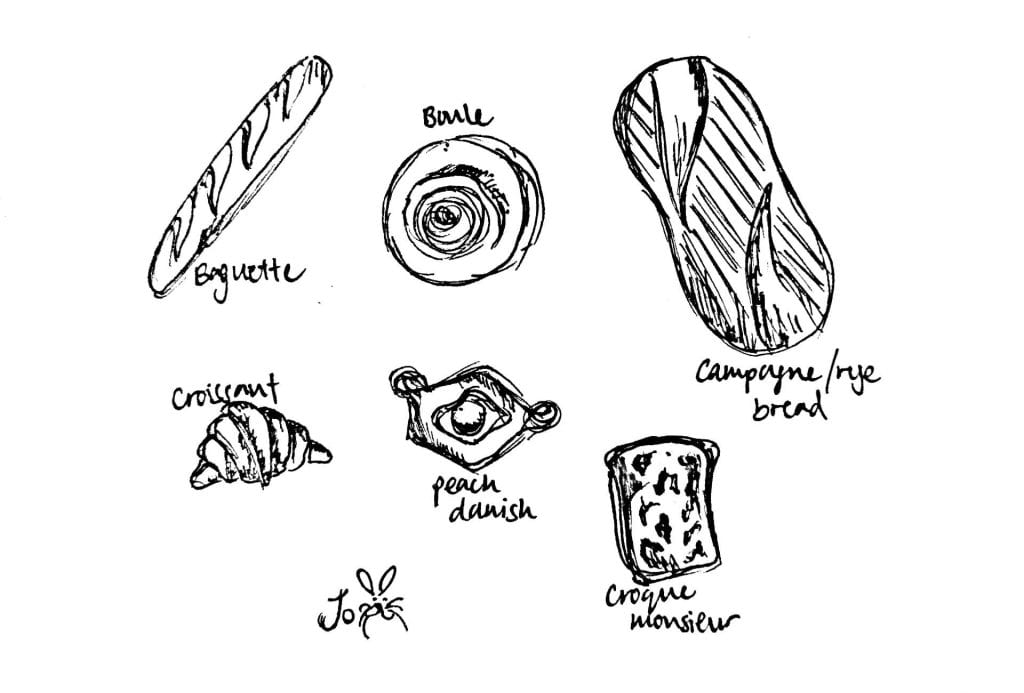In my previous posts, I’ve received many comments regarding leftovers at the café! Many of you were curious about how the café I work at manages leftovers at the end of the day. So, I thought it would be nice to share the efforts my café has in doing so.
On top of mains and drinks, the café sells pastries and artisanal bread (bread that has a relatively shorter shelf-life).
On days when business is really bad, there could be leftovers of four to six baguettes, two boules, two multigrain bread and a three-quarter filled display of pastries!
Though there are days with large amounts of leftovers, we don’t simply throw them away. All staff are allowed to bring the leftover bread and pastries home. We even pack some for the uncle who helps us clear our rubbish!
Initially, I felt that it was an effective way of managing leftovers by redistributing them to café workers.
However, Joseph’s comment in my previous post made me question myself.
‘It’s a good policy but I can’t help but feel like it was not very effective. There were times when I would bring home a pastry, take a bite, realise how stale it was, and throw it away.’
– Joseph
Has giving away leftovers really solved the issue of food waste?
At the start, I was excited to bring leftover bread and pastries home because that means I’ll have my next few days of breakfast planned out. As time passed, I found myself bringing less pastries and bread home. That’s what happened to my co-worker too. We ended up giving the uncle more pastries and bread as we didn’t bear to throw them away. However, I realised that we were avoiding our waste and merely pushing the responsibility of finishing the leftovers to the cleaner uncle. We assumed that the uncle would be able to finish all the food that we gave him. Yet, he may not be able to. These leftovers would either be passed on to others or end up as waste eventually when it is not consumed. This can be seen on the ground where dumpster divers find large amounts of bread being dumped daily.
Looking at food waste at a larger scale, there has been efforts by individuals and collaborations with businesses to redistribute leftover food. People were informed of the leftovers and allowed to take home as much as they want. However, who should hold the final responsibility of finishing the leftovers? The food businesses or the consumers?
To me, it’s both.
I feel that redistributing leftovers is a good start to reducing food waste, though it should not be the only way to do so. Food production needs to be managed too. The success of redistributing leftovers boils down to one’s needs and ability to finish whatever one has taken. Given that we are allowed to take as much food as we want, be it in the case of my café, or in the restaurants, we should take only what we can finish. If we are unable to finish the food that we have taken, it would be best to redistribute it to someone who is willing and able to finish it.





itfigures52 September 26, 2020
Dear Jo,
I wholeheartedly agree with your point on managing food waste. From a company’s perspective, I have seen some policies that do help to mitigate food wastage. I remember my manager filling out inventory forms at the end of the work day, tallying the amount of pastries that could not be sold and sending this information to upper management. The next day, there would be fewer of these pastries delivered to our cafe branch, thus minimising the number of pastries wasted!
Funnily enough, I remember one particular pastry, a cheesy longbread that was only ever purchased by me XD . That pastry was eventually discontinued because I was the only customer buying it and the cafe couldn’t afford to keep offloading the extras to me hahaha! In a way, it makes both economic and environmental sense to discontinue it. There’s no point in using more resources to make a product that won’t even be consumed.
But I low key still miss that cheesy longbread 🙁
jolee2001 September 28, 2020 — Post Author
Hi Joseph!
Glad to know that we both have similar thoughts on the efforts food businesses put into managing food waste! Just like the cafe you used to work at, my cafe has also been monitoring their sale of pastries. However, I feel that it is hard to grasp the right amount of food to be supplied, and waste may not always be minimised. Different people come and go everyday, and although the supply of croque monsieur (for example) on one day may be lower, the demand seems to be higher. On the other hand, when the supply of croque monsieur increases due to good sales the previous day, the demand for it somehow drops the next day. That leads to more leftovers 🙁 I guess, there is never a sole and perfect solution to any problem. At the company level, monitoring the supply of food may be one of the better ways to reduce waste despite its limitations. A long term observation would probably help in finding out the optimum supply of food that can benefit food businesses and at the same time minimise waste!
As for your cheesy longbread that you miss, it sounds LOVELY! Have you considered making one on your own? ><
– Jo
yuxun September 26, 2020
Hi Jo!
You brought up an interesting point that the responsibility of food wastes lies on the shoulders of both consumers or businesses. Because personally, I’ve always felt that businesses bear a larger brunt of responsibility since they’re the one’s sourcing and producing the food. Hence, what role can consumers play in reducing food waste, other than ordering what they need instead of impulsively ordering?
Cheers
Yu Xun
jolee2001 September 29, 2020 — Post Author
Hello Yu Xun,
Thanks for dropping by my blog! I feel that consumers can reduce their food waste during the pre-ordering and post-ordering stages. Before they order their food, consumers could find out the portion size difference, to ensure they do not accidentally over order. If consumers would like to try a spread of dishes, it would be good to go with a group of friends rather than to order a number of dishes alone, just to try a bit of everything. By doing so, consumers can enjoy a variety of food with their friends, and not have to worry about not finishing their meal. A small tip that works for me is, not to order when you’re extremely hungry! I tend to order a lot of food when I’m starving, so let your family or friend help you with the orders when you’re hungry! In situations where the order has already been made and consumers are unable to finish their food, they could request for a takeaway instead of throwing them into the bin. But I’m sure that’s not all!
Do you have any special tips on how you reduce food waste? 🙂
– Jo
Yu Xun September 29, 2020
Hi Jo,
Thanks for replying! Personally I rarely ever eat out but on the occasions I do, I’ve always made a conscious effort to finish whatever that’s on my plate. I guess that’s down to my parents drilling into me the habit of not wasting food since young. And yes my family does request for takeaway for our leftover food in the event we’re unable to finish eating it. We usually will end up heating up and consuming it within the next day or so at home.
Another practice that I usually do is to pass along the food items that I dislike to my family members to consume. For instance, if the dish itself contains mushrooms (please don’t judge, I really don’t like them) I would usually scoop it out and give it to my family members. That way, the food won’t get thrown out and it’s a tiny gesture to avoid food waste.
Cheers
Yu Xun
jolee2001 September 29, 2020 — Post Author
Hello Yu Xun,
Same here! I guess I’m just always very hungry, and that’s why I can finish my food most of the times >< It's nice to see that we are doing our part in minimising our waste! Hopefully, we can encourage people around us to do the same too 🙂
– Jo
ENV3102 October 12, 2020
Yuxun,
Nice to meet a fellow mushroom-hater (I also pass them on to someone else, although tbh, I usually say I’m allergic to them so I don’t have to deal with them).
🙂
jc